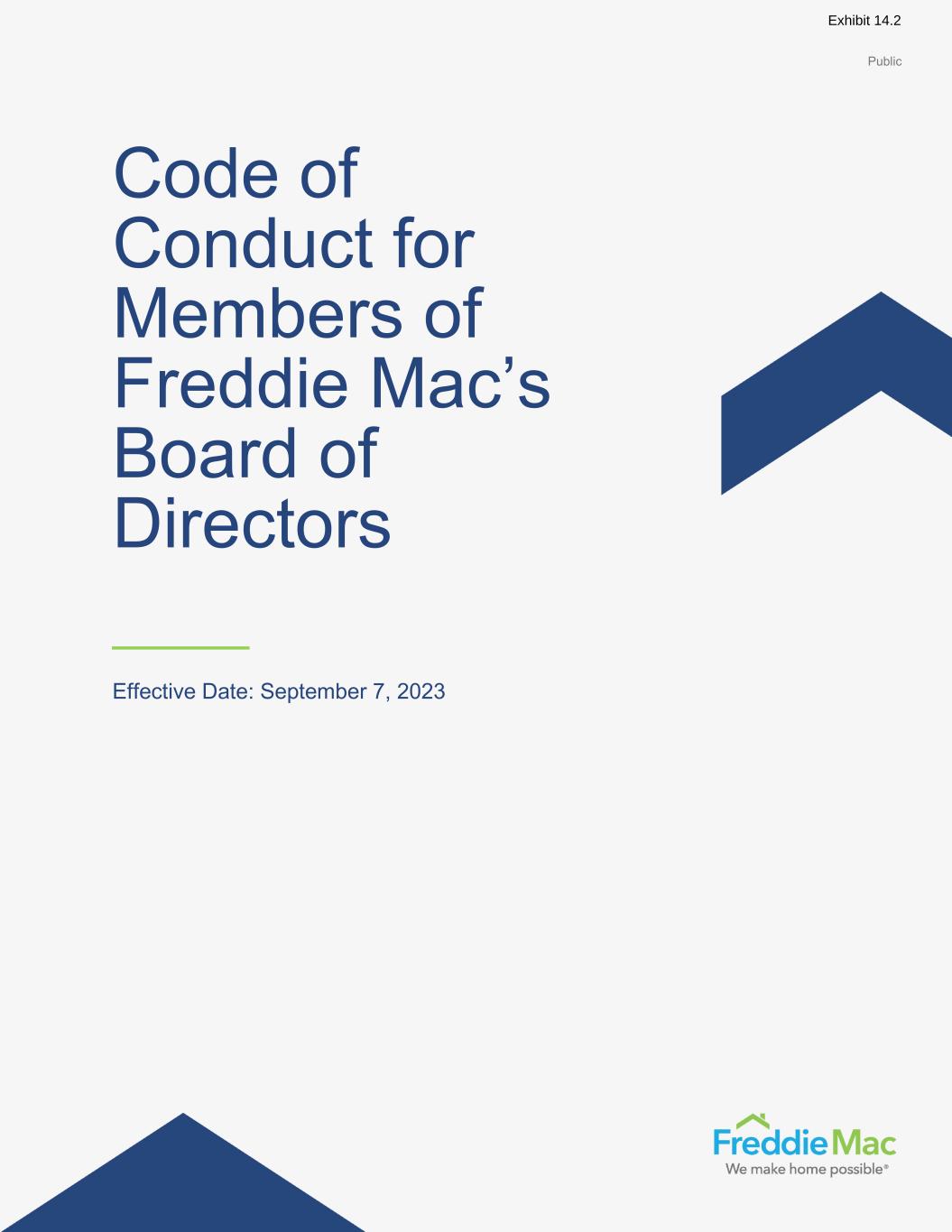
Code of Conduct for Members of Freddie Mac’s Board of Directors Effective Date: September 7, 2023 Public
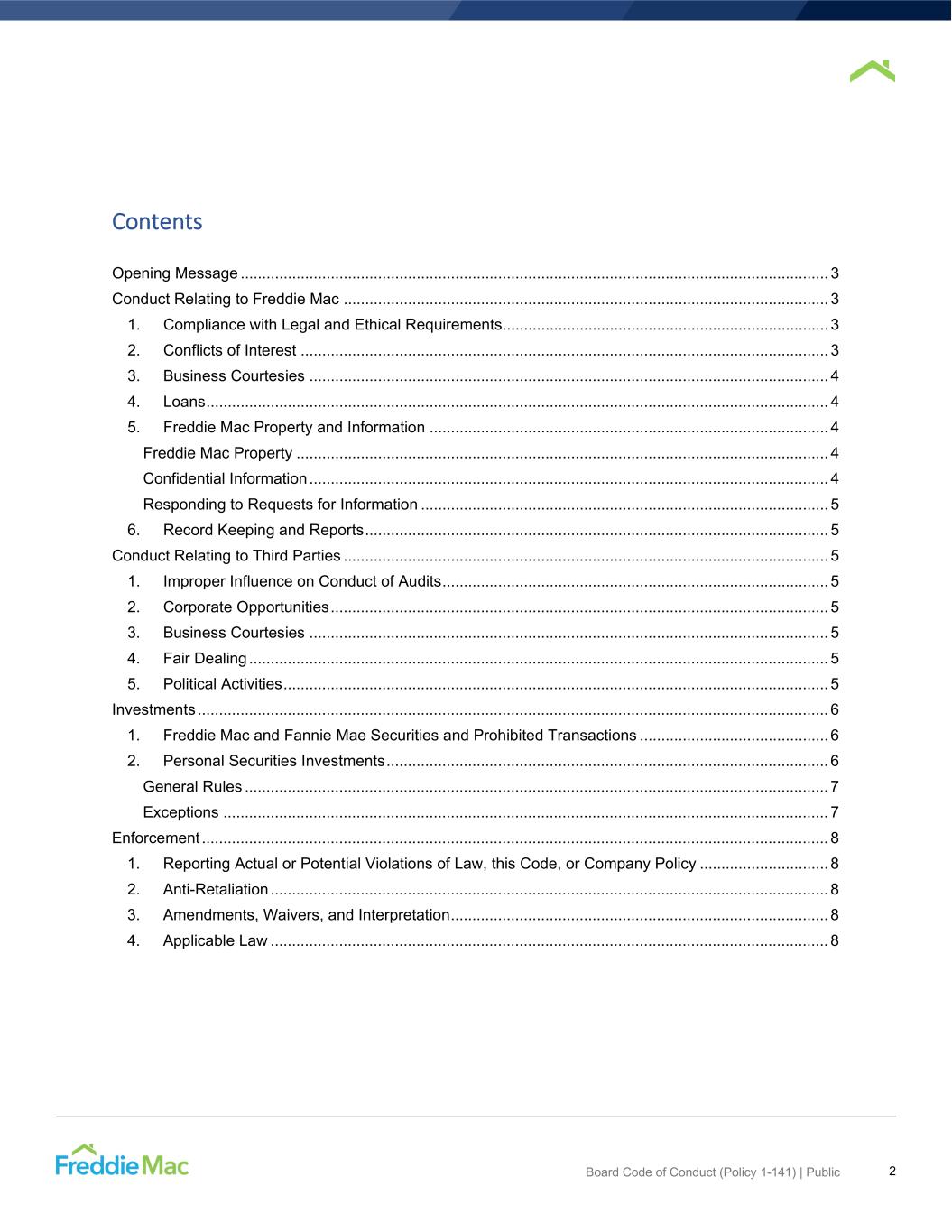
Board Code of Conduct (Policy 1-141) | Public 2 Contents Opening Message ......................................................................................................................................... 3 Conduct Relating to Freddie Mac ................................................................................................................. 3 1. Compliance with Legal and Ethical Requirements............................................................................ 3 2. Conflicts of Interest ........................................................................................................................... 3 3. Business Courtesies ......................................................................................................................... 4 4. Loans ................................................................................................................................................. 4 5. Freddie Mac Property and Information ............................................................................................. 4 Freddie Mac Property ............................................................................................................................ 4 Confidential Information ......................................................................................................................... 4 Responding to Requests for Information ............................................................................................... 5 6. Record Keeping and Reports ............................................................................................................ 5 Conduct Relating to Third Parties ................................................................................................................. 5 1. Improper Influence on Conduct of Audits .......................................................................................... 5 2. Corporate Opportunities .................................................................................................................... 5 3. Business Courtesies ......................................................................................................................... 5 4. Fair Dealing ....................................................................................................................................... 5 5. Political Activities ............................................................................................................................... 5 Investments ................................................................................................................................................... 6 1. Freddie Mac and Fannie Mae Securities and Prohibited Transactions ............................................ 6 2. Personal Securities Investments ....................................................................................................... 6 General Rules ........................................................................................................................................ 7 Exceptions ............................................................................................................................................. 7 Enforcement .................................................................................................................................................. 8 1. Reporting Actual or Potential Violations of Law, this Code, or Company Policy .............................. 8 2. Anti-Retaliation .................................................................................................................................. 8 3. Amendments, Waivers, and Interpretation ........................................................................................ 8 4. Applicable Law .................................................................................................................................. 8
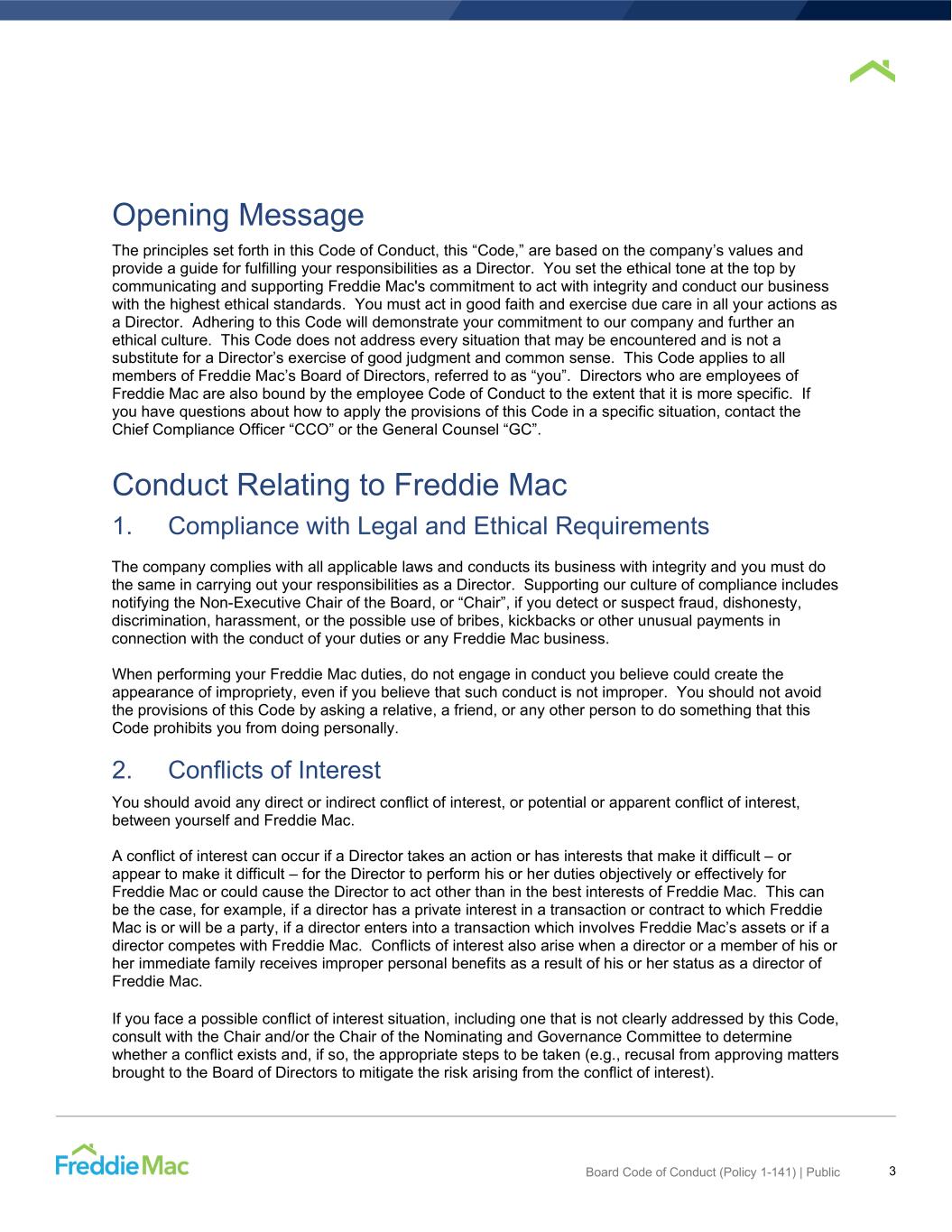
Board Code of Conduct (Policy 1-141) | Public 3 Opening Message The principles set forth in this Code of Conduct, this “Code,” are based on the company’s values and provide a guide for fulfilling your responsibilities as a Director. You set the ethical tone at the top by communicating and supporting Freddie Mac's commitment to act with integrity and conduct our business with the highest ethical standards. You must act in good faith and exercise due care in all your actions as a Director. Adhering to this Code will demonstrate your commitment to our company and further an ethical culture. This Code does not address every situation that may be encountered and is not a substitute for a Director’s exercise of good judgment and common sense. This Code applies to all members of Freddie Mac’s Board of Directors, referred to as “you”. Directors who are employees of Freddie Mac are also bound by the employee Code of Conduct to the extent that it is more specific. If you have questions about how to apply the provisions of this Code in a specific situation, contact the Chief Compliance Officer “CCO” or the General Counsel “GC”. Conduct Relating to Freddie Mac 1. Compliance with Legal and Ethical Requirements The company complies with all applicable laws and conducts its business with integrity and you must do the same in carrying out your responsibilities as a Director. Supporting our culture of compliance includes notifying the Non-Executive Chair of the Board, or “Chair”, if you detect or suspect fraud, dishonesty, discrimination, harassment, or the possible use of bribes, kickbacks or other unusual payments in connection with the conduct of your duties or any Freddie Mac business. When performing your Freddie Mac duties, do not engage in conduct you believe could create the appearance of impropriety, even if you believe that such conduct is not improper. You should not avoid the provisions of this Code by asking a relative, a friend, or any other person to do something that this Code prohibits you from doing personally. 2. Conflicts of Interest You should avoid any direct or indirect conflict of interest, or potential or apparent conflict of interest, between yourself and Freddie Mac. A conflict of interest can occur if a Director takes an action or has interests that make it difficult – or appear to make it difficult – for the Director to perform his or her duties objectively or effectively for Freddie Mac or could cause the Director to act other than in the best interests of Freddie Mac. This can be the case, for example, if a director has a private interest in a transaction or contract to which Freddie Mac is or will be a party, if a director enters into a transaction which involves Freddie Mac’s assets or if a director competes with Freddie Mac. Conflicts of interest also arise when a director or a member of his or her immediate family receives improper personal benefits as a result of his or her status as a director of Freddie Mac. If you face a possible conflict of interest situation, including one that is not clearly addressed by this Code, consult with the Chair and/or the Chair of the Nominating and Governance Committee to determine whether a conflict exists and, if so, the appropriate steps to be taken (e.g., recusal from approving matters brought to the Board of Directors to mitigate the risk arising from the conflict of interest).
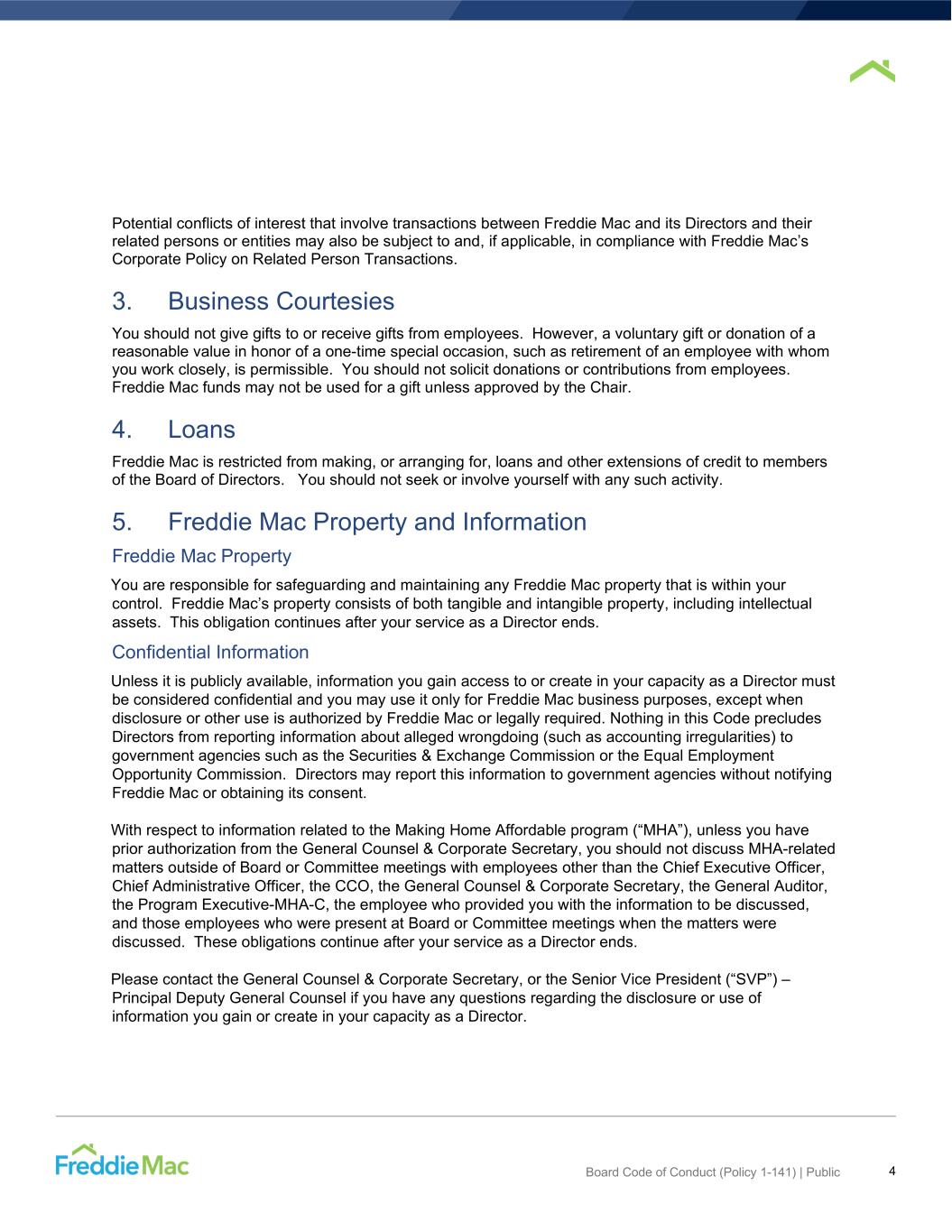
Board Code of Conduct (Policy 1-141) | Public 4 Potential conflicts of interest that involve transactions between Freddie Mac and its Directors and their related persons or entities may also be subject to and, if applicable, in compliance with Freddie Mac’s Corporate Policy on Related Person Transactions. 3. Business Courtesies You should not give gifts to or receive gifts from employees. However, a voluntary gift or donation of a reasonable value in honor of a one-time special occasion, such as retirement of an employee with whom you work closely, is permissible. You should not solicit donations or contributions from employees. Freddie Mac funds may not be used for a gift unless approved by the Chair. 4. Loans Freddie Mac is restricted from making, or arranging for, loans and other extensions of credit to members of the Board of Directors. You should not seek or involve yourself with any such activity. 5. Freddie Mac Property and Information Freddie Mac Property You are responsible for safeguarding and maintaining any Freddie Mac property that is within your control. Freddie Mac’s property consists of both tangible and intangible property, including intellectual assets. This obligation continues after your service as a Director ends. Confidential Information Unless it is publicly available, information you gain access to or create in your capacity as a Director must be considered confidential and you may use it only for Freddie Mac business purposes, except when disclosure or other use is authorized by Freddie Mac or legally required. Nothing in this Code precludes Directors from reporting information about alleged wrongdoing (such as accounting irregularities) to government agencies such as the Securities & Exchange Commission or the Equal Employment Opportunity Commission. Directors may report this information to government agencies without notifying Freddie Mac or obtaining its consent. With respect to information related to the Making Home Affordable program (“MHA”), unless you have prior authorization from the General Counsel & Corporate Secretary, you should not discuss MHA-related matters outside of Board or Committee meetings with employees other than the Chief Executive Officer, Chief Administrative Officer, the CCO, the General Counsel & Corporate Secretary, the General Auditor, the Program Executive-MHA-C, the employee who provided you with the information to be discussed, and those employees who were present at Board or Committee meetings when the matters were discussed. These obligations continue after your service as a Director ends. Please contact the General Counsel & Corporate Secretary, or the Senior Vice President (“SVP”) – Principal Deputy General Counsel if you have any questions regarding the disclosure or use of information you gain or create in your capacity as a Director.

Board Code of Conduct (Policy 1-141) | Public 5 Responding to Requests for Information Refer any media or congressional inquiry you receive regarding Freddie Mac to the VP-Corporate Communications & Marketing. Refer to the CCO any inquiry you receive from the Federal Housing Finance Agency (“FHFA”), the FHFA Office of Inspector General or other government agency. 6. Record Keeping and Reports It is Freddie Mac’s policy that any report, document, or other information that Freddie Mac, directly or indirectly, files with or submits to a government agency or discloses to the public must be fair, timely, and understandable given the circumstances under which it is used, filed, submitted, or disclosed. Directors should maintain corporate records consistent with direction provided by management and minimum legal requirements. Conduct Relating to Third Parties 1. Improper Influence on Conduct of Audits You may not, directly or indirectly, take any action to coerce, manipulate, mislead, or fraudulently influence any independent or certified public accountant engaged in the performance of an audit or review of Freddie Mac’s financial statements. You also must cooperate fully in any such audit or review. 2. Corporate Opportunities You must not use, directly or indirectly, for your personal benefit or the benefit of any other individual or entity: (1) company property or information; or (2) opportunities you learn of through your position as a Director or through the use of company property or information. 3. Business Courtesies You should refuse gifts, favors, travel, entertainment, loans, discounts, or other preferential treatment if they could appear to represent an attempt by the donor to obtain favorable treatment in its business dealings with Freddie Mac or if they are lavish or would not be considered a generally accepted business practice. 4. Fair Dealing When fulfilling your responsibilities as a Director, you should deal fairly with Freddie Mac’s competitors, business partners, customers, and vendors. 5. Political Activities You may fully engage in the political process consistent with your personal views and interests, and without regard to Freddie Mac’s business interests. However, you must be careful to distinguish your personal political views from those of Freddie Mac. You may not use any Freddie Mac resources or facilities (including office supplies and administrative personnel) in connection with your political activities.
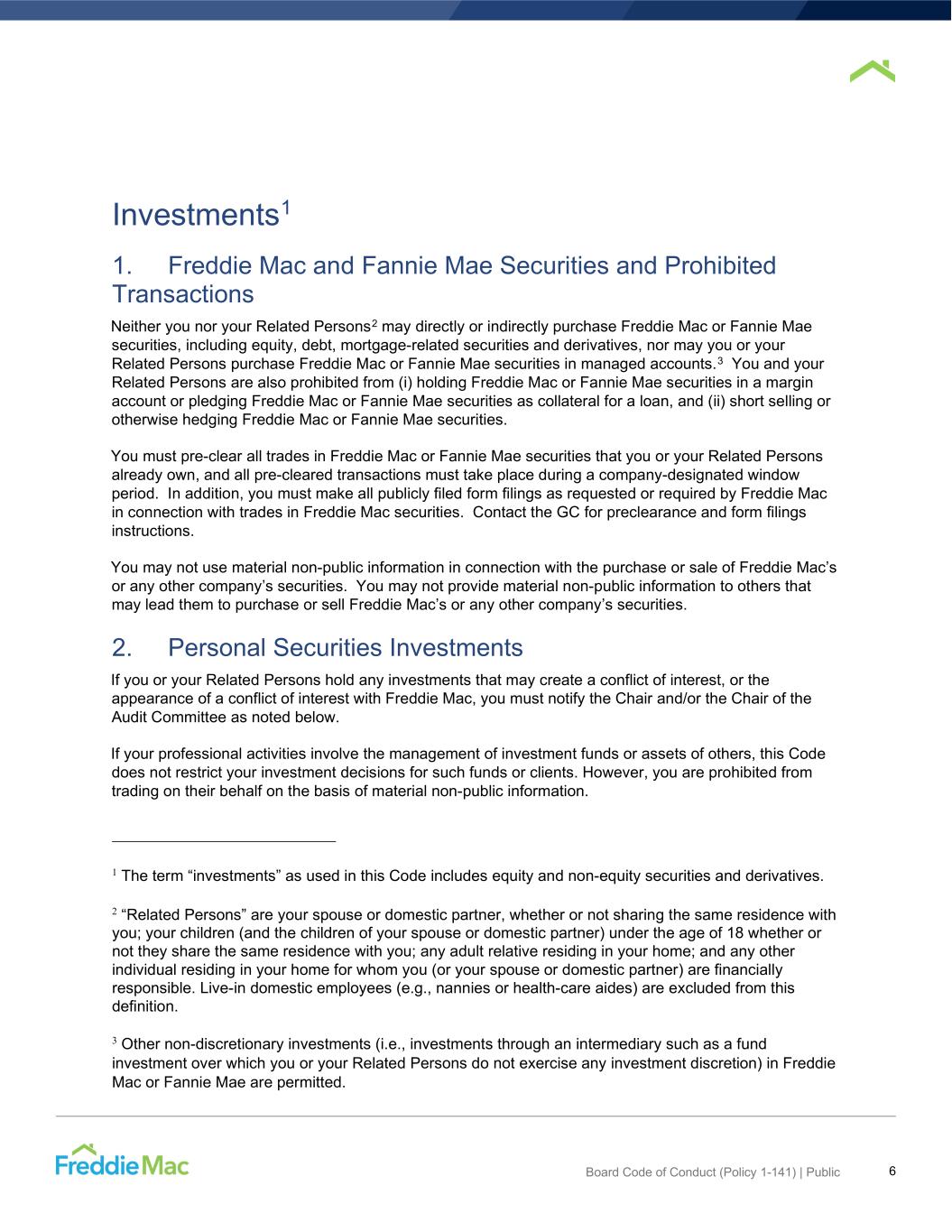
Board Code of Conduct (Policy 1-141) | Public 6 Investments1 1. Freddie Mac and Fannie Mae Securities and Prohibited Transactions Neither you nor your Related Persons2 may directly or indirectly purchase Freddie Mac or Fannie Mae securities, including equity, debt, mortgage-related securities and derivatives, nor may you or your Related Persons purchase Freddie Mac or Fannie Mae securities in managed accounts.3 You and your Related Persons are also prohibited from (i) holding Freddie Mac or Fannie Mae securities in a margin account or pledging Freddie Mac or Fannie Mae securities as collateral for a loan, and (ii) short selling or otherwise hedging Freddie Mac or Fannie Mae securities. You must pre-clear all trades in Freddie Mac or Fannie Mae securities that you or your Related Persons already own, and all pre-cleared transactions must take place during a company-designated window period. In addition, you must make all publicly filed form filings as requested or required by Freddie Mac in connection with trades in Freddie Mac securities. Contact the GC for preclearance and form filings instructions. You may not use material non-public information in connection with the purchase or sale of Freddie Mac’s or any other company’s securities. You may not provide material non-public information to others that may lead them to purchase or sell Freddie Mac’s or any other company’s securities. 2. Personal Securities Investments If you or your Related Persons hold any investments that may create a conflict of interest, or the appearance of a conflict of interest with Freddie Mac, you must notify the Chair and/or the Chair of the Audit Committee as noted below. If your professional activities involve the management of investment funds or assets of others, this Code does not restrict your investment decisions for such funds or clients. However, you are prohibited from trading on their behalf on the basis of material non-public information. 1 The term “investments” as used in this Code includes equity and non-equity securities and derivatives. 2 “Related Persons” are your spouse or domestic partner, whether or not sharing the same residence with you; your children (and the children of your spouse or domestic partner) under the age of 18 whether or not they share the same residence with you; any adult relative residing in your home; and any other individual residing in your home for whom you (or your spouse or domestic partner) are financially responsible. Live-in domestic employees (e.g., nannies or health-care aides) are excluded from this definition. 3 Other non-discretionary investments (i.e., investments through an intermediary such as a fund investment over which you or your Related Persons do not exercise any investment discretion) in Freddie Mac or Fannie Mae are permitted.
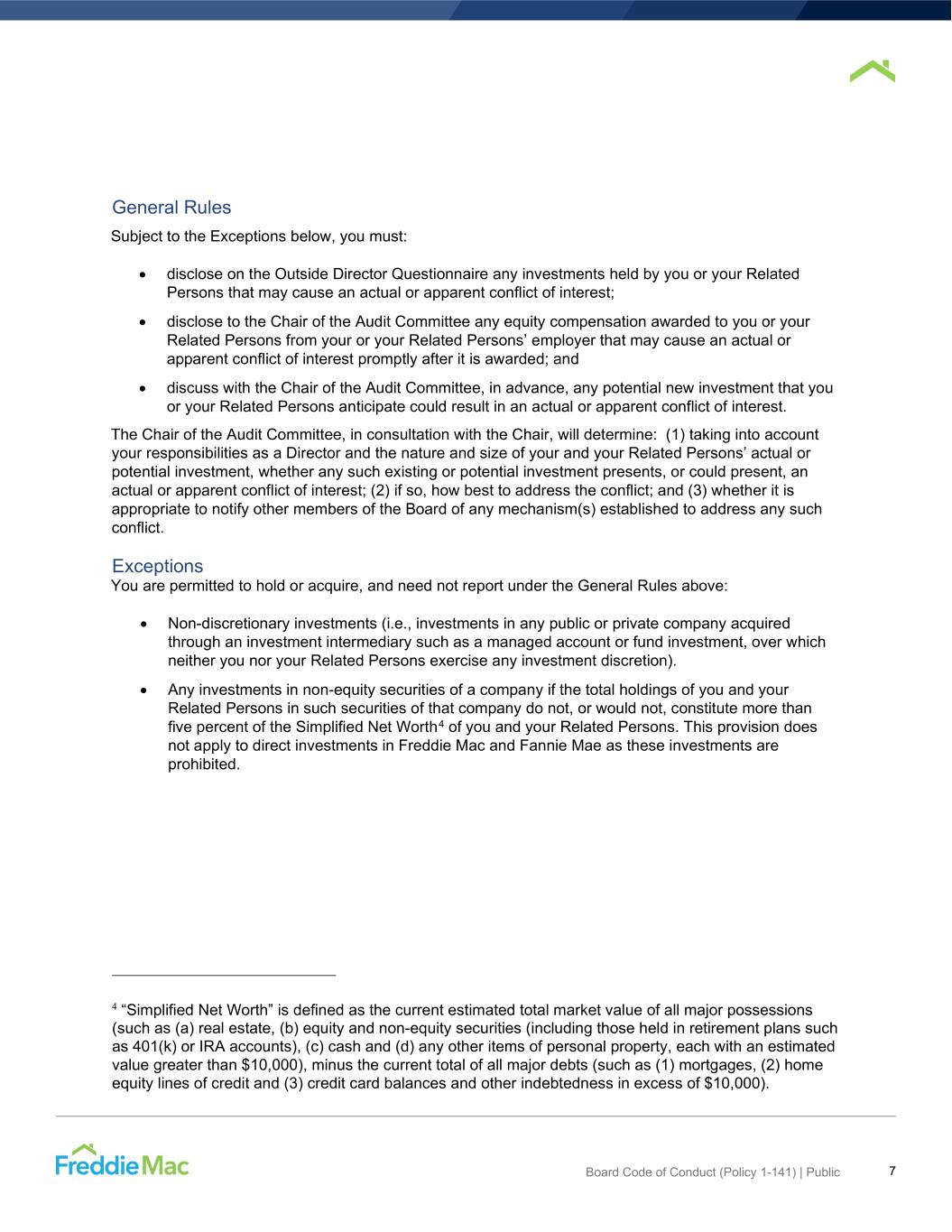
Board Code of Conduct (Policy 1-141) | Public 7 General Rules Subject to the Exceptions below, you must: • disclose on the Outside Director Questionnaire any investments held by you or your Related Persons that may cause an actual or apparent conflict of interest; • disclose to the Chair of the Audit Committee any equity compensation awarded to you or your Related Persons from your or your Related Persons’ employer that may cause an actual or apparent conflict of interest promptly after it is awarded; and • discuss with the Chair of the Audit Committee, in advance, any potential new investment that you or your Related Persons anticipate could result in an actual or apparent conflict of interest. The Chair of the Audit Committee, in consultation with the Chair, will determine: (1) taking into account your responsibilities as a Director and the nature and size of your and your Related Persons’ actual or potential investment, whether any such existing or potential investment presents, or could present, an actual or apparent conflict of interest; (2) if so, how best to address the conflict; and (3) whether it is appropriate to notify other members of the Board of any mechanism(s) established to address any such conflict. Exceptions You are permitted to hold or acquire, and need not report under the General Rules above: • Non-discretionary investments (i.e., investments in any public or private company acquired through an investment intermediary such as a managed account or fund investment, over which neither you nor your Related Persons exercise any investment discretion). • Any investments in non-equity securities of a company if the total holdings of you and your Related Persons in such securities of that company do not, or would not, constitute more than five percent of the Simplified Net Worth4 of you and your Related Persons. This provision does not apply to direct investments in Freddie Mac and Fannie Mae as these investments are prohibited. 4 “Simplified Net Worth” is defined as the current estimated total market value of all major possessions (such as (a) real estate, (b) equity and non-equity securities (including those held in retirement plans such as 401(k) or IRA accounts), (c) cash and (d) any other items of personal property, each with an estimated value greater than $10,000), minus the current total of all major debts (such as (1) mortgages, (2) home equity lines of credit and (3) credit card balances and other indebtedness in excess of $10,000).

Board Code of Conduct (Policy 1-141) | Public 8 Enforcement 1. Reporting Actual or Potential Violations of Law, this Code, or Company Policy As a Director of the company, you must share with the Chair any knowledge you may have of an actual or potential violation of this Code, applicable law or corporate policies. You also must cooperate fully in any investigation of any such matters. 2. Anti-Retaliation You may not retaliate against any individual or entity who, based on a reasonable, good faith belief: (i) reports a concern about potential illegal or unethical conduct, or a violation of applicable law, this Code, or corporate policy or (ii) assists or otherwise participates in the investigation or resolution of such a report. 3. Amendments, Waivers, and Interpretation Only the Board may amend this Code or grant a waiver of any requirement of this Code. Waivers will be publicly disclosed as required by applicable law. The Board has final authority to determine whether any Director’s conduct or action violates this Code or any applicable corporate policy and any appropriate discipline for any such violations, including, but not limited to, removal as a Director. 4. Applicable Law Matters relating to this Code and the interpretation of this Code will be governed in accordance with the laws of the United States. Insofar as there may be no applicable precedent, and insofar as to do so would not frustrate any provisions of this Code, the laws of the Commonwealth of Virginia will be deemed reflective of the laws of the United States.
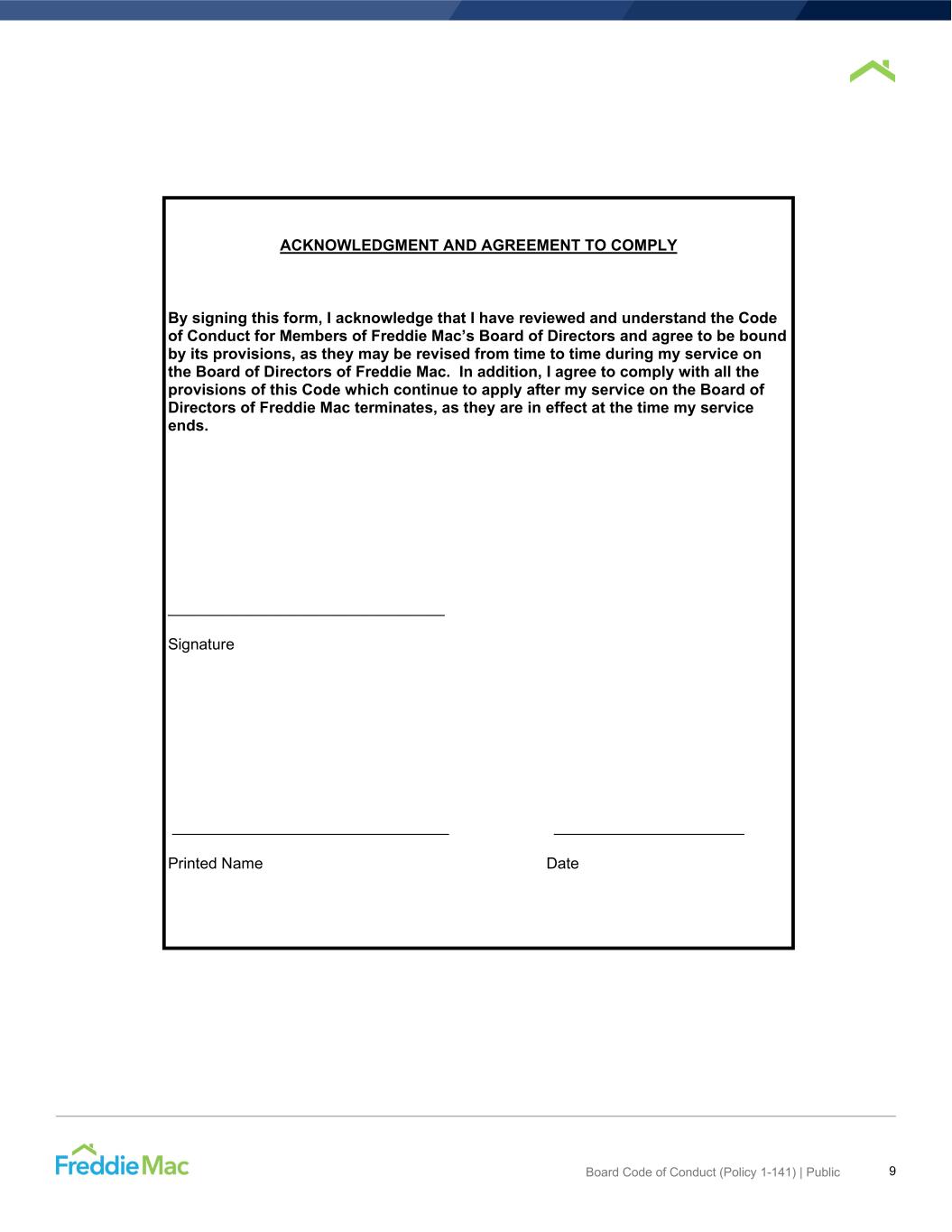
Board Code of Conduct (Policy 1-141) | Public 9 ACKNOWLEDGMENT AND AGREEMENT TO COMPLY By signing this form, I acknowledge that I have reviewed and understand the Code of Conduct for Members of Freddie Mac’s Board of Directors and agree to be bound by its provisions, as they may be revised from time to time during my service on the Board of Directors of Freddie Mac. In addition, I agree to comply with all the provisions of this Code which continue to apply after my service on the Board of Directors of Freddie Mac terminates, as they are in effect at the time my service ends. ________________________________ Signature ________________________________ ______________________ Printed Name Date








